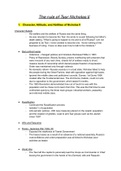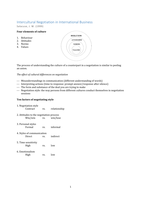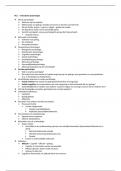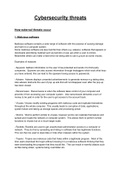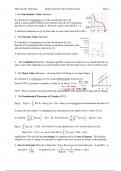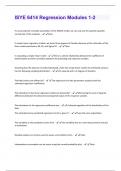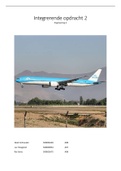The rule of Tsar Nicholas ll
1. Character, Attitude, and Abilities of Nicholas II
Character/ Beliefs
- His welfare and the welfare of Russia was the same thing.
- He was reluctant to become the Tsar- He wrote to cousin following his father's
death stating, "What is going to happen to me and to all of Russia? I am not
prepared to be Tsar. I never wanted to become one. I know nothing of the
business of ruling. I have no idea even how to talk to the ministers."
● Bad political leader
- Indecisive - changed policies and ministers Dismissed Witte in 1903
- Policy of Repression, Bloody Sunday, prisons overflowing with prisoners that
were innocent of any real crime, streets full of soldiers ready to shoot,
massive levels of censorship which denied people freedom of expression.
Order was maintained only through violence.
- No domestic reform- Russian society is in a bad state. Nicholas failed to help
the people during the Great Famine, deal with opposition against high taxes,
- Ignored the middle class and politicians/ councils. Dumas, 1st Duma 1906
created after the Fundamental laws. The 2nd Duma, Kadets, could not vote
due to opposition to the government, which lasted 5 months.
- The 1905 Revolution demonstrated how out of touch he was with the
population and he chose not to learn from this. This was the first time he was
confronted openly by the three main groups: industrial workers, peasantry
and reformist middle class.
● Russification
- Continued the Russification process
- Isolated ½ of population
- Anti-semetic policies - 600 new measures placed on the Jewish population
and the creation of ghettos. Lead to anti-Tsar groups such as the Jewish
Union 1897
● Wife and Rasputine
● Russo- Japanese War 1904- 06
- Exposed the weakness of Tsarist Government
- The heavy losses as a result of an absence of a national assembly, Russia’s
overconfidence and under preparation was all linked to Nicholas' poor
activities as leader.
● World War
- The Tsar left the capital to personally lead the troops as Commander in Chief
leaving the government in the hands of his (German) wife and Rasputin.
, - During the war, Nicolas closed the Duma and this alienated the liberals 1906.
Historians - Unfit to run a village post office - Historians weak, indecisive and disorganised.
2. Political, Economic and Social problems of Russia in 1894
- Russia covered 8 million square miles.impossible to govern.
- Political backwardness - western countries had some form of democratic
representative government but Russia did not have this.
- no parliament, had no legal right to exist, no free press, gov censorship imposed on
media, books, journals.
- Secret societies for political reform of revolution- harassments and attacks of people
were usual occurrences.
- Peasants took up 82% of the population 0.5% were the ruling class.
Finance - Transportation limited, inhibited imperial expansion.
Bad bakining system found it hard to raise capital and didn't master investment and
borrowing on a big scale. Falling behind to other European countries, lacking in enterprise.
Bad climate, soil and farming restricted the growth of economic expansion. Too many
peasants and not enough fertile land. Land prices too high, gov taxation of land sales
imposed to raise revenue. The only way for peasants to buy land was to borrow from the
government but burdened with a large mortgage which would be impossible to pay.
Peasants were limited in being able to contribute to the russian economy.
Peasants called dark masses cuz they were not were not uneducated, and the gov said they
can only be held in check through repression. Upper classes scared of the peasant
population.
https://www.bbc.co.uk/bitesize/guides/z2prcdm/revision/3
3. Opposition, liberal, populist and Marxists
- Revolutionaries(Extremists)
- Reformers( Liberals)
Revolutionaires: Populists, Social Revolutionaries(SR), Social Democrats(SD)
Populist view
● The tsarist system is flawed and must end
● Future is in the hands of the peasants. (take lead in transforming russia,
● Their duty is to educate the pesantary into awareness of their revolutionary role
● Members were upper/middle class
● Tsarist system to end. Overthrow the Tsar by the PeasantsPeasants.
● Went to the countryside to live with peasants to turn them into revolutionists.
However peasants saw them as people with no real knowledge of real life.
1. Character, Attitude, and Abilities of Nicholas II
Character/ Beliefs
- His welfare and the welfare of Russia was the same thing.
- He was reluctant to become the Tsar- He wrote to cousin following his father's
death stating, "What is going to happen to me and to all of Russia? I am not
prepared to be Tsar. I never wanted to become one. I know nothing of the
business of ruling. I have no idea even how to talk to the ministers."
● Bad political leader
- Indecisive - changed policies and ministers Dismissed Witte in 1903
- Policy of Repression, Bloody Sunday, prisons overflowing with prisoners that
were innocent of any real crime, streets full of soldiers ready to shoot,
massive levels of censorship which denied people freedom of expression.
Order was maintained only through violence.
- No domestic reform- Russian society is in a bad state. Nicholas failed to help
the people during the Great Famine, deal with opposition against high taxes,
- Ignored the middle class and politicians/ councils. Dumas, 1st Duma 1906
created after the Fundamental laws. The 2nd Duma, Kadets, could not vote
due to opposition to the government, which lasted 5 months.
- The 1905 Revolution demonstrated how out of touch he was with the
population and he chose not to learn from this. This was the first time he was
confronted openly by the three main groups: industrial workers, peasantry
and reformist middle class.
● Russification
- Continued the Russification process
- Isolated ½ of population
- Anti-semetic policies - 600 new measures placed on the Jewish population
and the creation of ghettos. Lead to anti-Tsar groups such as the Jewish
Union 1897
● Wife and Rasputine
● Russo- Japanese War 1904- 06
- Exposed the weakness of Tsarist Government
- The heavy losses as a result of an absence of a national assembly, Russia’s
overconfidence and under preparation was all linked to Nicholas' poor
activities as leader.
● World War
- The Tsar left the capital to personally lead the troops as Commander in Chief
leaving the government in the hands of his (German) wife and Rasputin.
, - During the war, Nicolas closed the Duma and this alienated the liberals 1906.
Historians - Unfit to run a village post office - Historians weak, indecisive and disorganised.
2. Political, Economic and Social problems of Russia in 1894
- Russia covered 8 million square miles.impossible to govern.
- Political backwardness - western countries had some form of democratic
representative government but Russia did not have this.
- no parliament, had no legal right to exist, no free press, gov censorship imposed on
media, books, journals.
- Secret societies for political reform of revolution- harassments and attacks of people
were usual occurrences.
- Peasants took up 82% of the population 0.5% were the ruling class.
Finance - Transportation limited, inhibited imperial expansion.
Bad bakining system found it hard to raise capital and didn't master investment and
borrowing on a big scale. Falling behind to other European countries, lacking in enterprise.
Bad climate, soil and farming restricted the growth of economic expansion. Too many
peasants and not enough fertile land. Land prices too high, gov taxation of land sales
imposed to raise revenue. The only way for peasants to buy land was to borrow from the
government but burdened with a large mortgage which would be impossible to pay.
Peasants were limited in being able to contribute to the russian economy.
Peasants called dark masses cuz they were not were not uneducated, and the gov said they
can only be held in check through repression. Upper classes scared of the peasant
population.
https://www.bbc.co.uk/bitesize/guides/z2prcdm/revision/3
3. Opposition, liberal, populist and Marxists
- Revolutionaries(Extremists)
- Reformers( Liberals)
Revolutionaires: Populists, Social Revolutionaries(SR), Social Democrats(SD)
Populist view
● The tsarist system is flawed and must end
● Future is in the hands of the peasants. (take lead in transforming russia,
● Their duty is to educate the pesantary into awareness of their revolutionary role
● Members were upper/middle class
● Tsarist system to end. Overthrow the Tsar by the PeasantsPeasants.
● Went to the countryside to live with peasants to turn them into revolutionists.
However peasants saw them as people with no real knowledge of real life.

